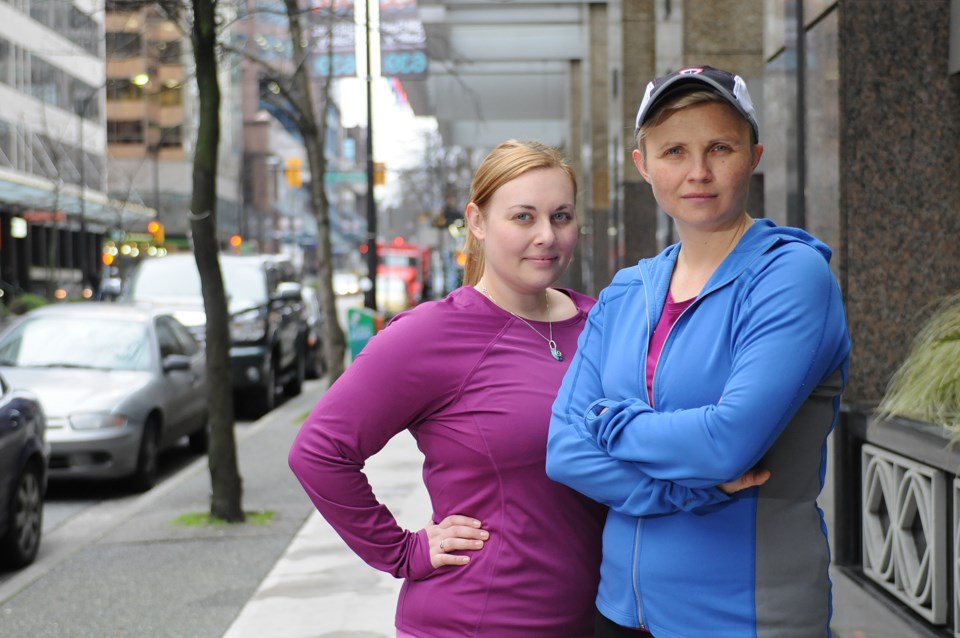If 42.2 kilometres is twice, four or even eight times farther than you want to run, you don’t have to go cover the full distance yourself to complete the BMO Vancouver Marathon. On May 3, for the first time in the 44-year history of the annual road race, runners can sign up in relay teams of two, three or four racers.
Race organizers have capped relay entries at 250, and say they are pleased how quickly the event is filling up.
“It’s a team building thing,” said Louise Kelaher, who helps run the front desk at the downton YWCA on Hornby St. and will run 12 kms for the second leg of the relay with a team of co-workers.
“A lot of us have done different events at the BMO before. We were looking at the website to play out what we were going to do during the [2015] year and there was a marathon option. They all happened to be standing there at the same time. We wanted to try it.”
For a four-person relay, each runner will cover different distances. The first and second legs are both 12 km, and those runners meet at the edge of Pacific Spirit Park after the starting racer climbs 50 metres up Camosun Street in Dunbar. The third leg is five-km long and begins on the flats of Point Grey, east of Spanish Banks. The 13-km anchor leg begins before the Burrard Bridge.
Runners will hand off a time chip in a designation transition zone, which will be separated from the race course to prevent congestion. A shuttle will transport racers to the end of the course where they can cheer for the teammate as she crosses the finish line. All racers get medals and individual swag.
Full disclosure: I’ve signed up a Courier relay team.
Since Kelaher, 44, started running four years ago, she has done as many half-marathons, including the BMO and Scotiabank races. But the 21.1-km distance takes its toll.
“I always wind up hurting myself and end up not doing something for a long period of time,” she said. “Ten and eight Ks, those I can keep doing and keep training for longer.”
In Canada, the BMO Vancouver Marathon is one of only three races that splits the marathon distance into shorter legs for multiple teammates. The other two are in Ottawa, both organized by the Somersault Event Series. The Winterman Marathon, held each February in Canada’s capital to raise money for the Ottawa Volunteer Search and Rescue team, has included a relay since the race first began in 2009. Participation increased quickly and is stable at roughly 1,200 runners, according to race director Gerry Godsoe.
“Participation grew during the early years when the event was getting established but then levelled off,” he said in an email. “The relays are popular because they allow groups of friends and colleagues to form teams and enjoy the challenge of doing longer distances.”
In preparation for the inaugural Vancouver Marathon relay, Kelaher’s team at the YWCA will run together on occasion and make time to cross-train. Sadie Henschel will run the five-km third leg through Kitsilano, and Stephanie Burk will anchor the team on the final 13-km downtown leg.
Erika Haraguchi will start the race, likely beside her sister who will run her first full marathon. Haraguchi, 28, is 36 weeks pregnant and her first child is due before the end of the month.
“I can’t back out now,” said Haraguchi, who ran her first half-marathon last year. “I found that, even when I finally committed to doing the half, that was definitely a driving force. I was committed to running three times a week and I enjoyed that motivation.”
This time, she’s committed to more than the race. All four racers know they’re essential for the team to complete the marathon.
“Am I really crazy to be signing up for a race in May when my baby is due at the end of January,” she asked. “But it’s nice motivation to have that goal. I have the support of my team.”
Training to compete with a team means being accountable to more than just yourself. BMO Vancouver Marathon race director Charlene Krepiakevich said races around North America are beginning to add team events and relays.
“Training, participating and fundraising as a group can add team spirit, competition, camaraderie and accountability,” she wrote in an email. “The BMO Vancouver Marathon Relay will create the same type of team dynamics. It will motivate runners to uphold their commitments — albeit time, dollars raised, fitness level or spirit.”
Eugene Eng, an automotive instructor at BCIT, was "strong-armed" into signing up for the relay with three co-workers in his faculty. The man who compelled them to run the relay won't compete on their team because he's doing the full marathon.
"We would only be holding him back," said Eng, 36. "He was tired of listening to us compaining all day about sitting at a desk and getting fat. We've all hit the stage in our life where we have to put a more conscience effort to stay fit. Our jobs can be sedentary and stressful."
Eng, who graduated from Van Tech secondary and now lives in Coquitlam, completed the Spartan Race and Tough Mudder in the past two summers and is now mulling longer road race distances once he trains for and completes his 12-km relay leg.
"By the time the day comes, I'll have to have some new shoes. In the last 10 years, it's fair to say for all of the teammembers it will be their first competitive run. Maybe one day when we're ready, we'll do the full thing. Or the half, maybe."



